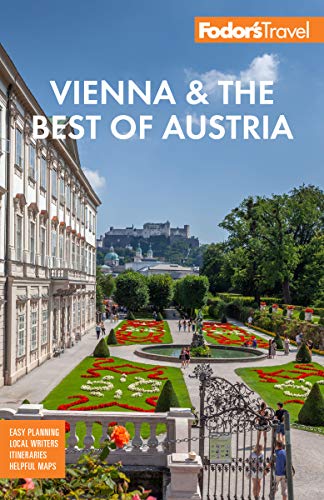Performing Arts
Do you want to time warp back to the 18th century at Mozart concerts featuring bewigged musicians in the opulent surroundings at Schönbrunn Palace? Or perhaps you'd like to cheer the divas at the grandest of grand opera at the Staatsoper, dive into the splendor of an evening concert of Strauss waltzes, or enjoy a trombone troupe at a Jazzkeller? Maybe a Baroque opera in a stunning avant-garde setting at the Theater an der Wien (where Beethoven's Fidelio premiered in 1805)? The choices are endless during the regular season, which runs from September to June. Locals enthusiastically partake of their city’s rich cultural offerings, and there are many tantalizing choices, so it's always a good idea to plan ahead.
But Austria is not only about the classics; it is as proud of Falco as it is of Haydn. In summer, Vienna turns into a festival town. ImPulsTanz for modern dance enthusiasts has a rich variety of performances and venues, and for some the chamber music festival, held amid 18th-century frescoes at the Laudon Water Palace, is too enticing to pass up.
Schedules and Seasons
A monthly printed program, the Wien-Programm, distributed by the city tourist board and available at any travel agency or hotel, gives an overview of what's going on in the worlds of opera, concerts, jazz, theater, and galleries, and similar information is posted on billboards and advertising columns around the city.
The film schedules in the daily newspapers Der Standard and Die Presse list foreign-language film showings; Der Falter, a weekly paper issued every Wednesday, publishes a comprehensive listing of events and films, while OmU lists showings for films in their original language with German subtitles.
Balls
The city’s ball culture is carefully nurtured, and almost everybody between the ages of 16 and 19 attends a dancing school (some even learn to waltz as part of the official high school curriculum). On your strolls through the inner city, peek in at Elmayer’s on Bräunerstrasse to see young couples practice the quadrille for the next Carnival extravaganza.
Ever since the 19th-century Congress of Vienna—when pundits joked "The city dances, but it never gets anything done"—Viennese extravagance and gaiety have been world-famous. Fasching, the season of Carnival, was given over to court balls, opera balls, masked balls, chambermaids' and bakers' balls, and a hundred other gatherings, many held within the glittering interiors of Baroque theaters and palaces. White-gloved women and men in white tie would glide over marble floors to heavenly melodies. They still do. Now, as in the days of Franz Josef, Vienna's old three-quarter-time rhythm strikes up anew at the stroke of the clock on New Year's Day and continues through Carnival, or Fasching.
During the Ball Season, as many as 40 balls may be held in a single evening. Many events are organized by a professional group, including the Hofburg New Year's Ball, Philharmonikerball (Ball of the Philharmonic Orchestra), Kaffeesiederball (Coffee Brewers' Ball), the Zuckerbaeckerball (Confectioners' Ball), or the Opernball (Opera Ball). The invitation reads "Frack mit Dekorationen," which means that ball gowns and tails are usually required for most events (you can always get your tux from a rental agency) and women mustn't wear white (reserved for debutantes). But there's something for everyone these days, including the "Ball of Bad Taste" or "Wallflower Ball." The zaniest might be the Life Ball, sponsored by a charity raising funds for people with HIV. After your gala evening, finish off the morning with a Katerfrühstuck—hangover breakfast—of goulash soup.
Among the 400 balls that are held each winter, the majority are open to the public. Ticket prices vary widely, and can go as high as €600. Starting at 8 or 9 pm, these "full dress" events last until 3 or 4 am.
Dance
Dance performances at the Staatsoper and Volksoper feature both classic and contemporary choreography. Dancers from both houses belong to the Vienna State Ballet under the direction of Manuel Legris, former star of the Paris Ballet.
Film
Vienna has a thriving film culture, with many viewers seeking original rather than German-dubbed versions of English-language films. If you're here in late October, make sure to check out Europe’s oldest film festival, the Viennale www.viennale.at/en, which draws crowds of nearly 100,000 to the city's historic movie palaces and showcases films by national and international directors.
Music
Vienna is one of the world's foremost music centers. Contemporary music gets its due, but it's the classics—the works of Beethoven, Brahms, Haydn, Mozart, Strauss, and Schubert—that draw the Viennese public and make tickets to the Wiener Philharmoniker the hottest of commodities. Vienna is home to four full symphony orchestras: the great Wiener Philharmoniker (Vienna Philharmonic), the outstanding Wiener Symphoniker (Vienna Symphony), the broadcasting service's ORF Symphony Orchestra, and the Niederösterreichische Tonkünstler. There are also hundreds of smaller groups, from world-renowned trios to chamber orchestras.
Although the well-known mid-May to mid-June Wiener Festwochen (Vienna Festival) signals the official end of the concert season, the rest of the summer brims with musical performances, particularly in the Theater an der Wien.
Opera and Operetta
Austria's handling of political scandals has led some to call it an "operetta state." It's small wonder that this antiquated art form is still cherished in musical theaters such as the Volksoper, albeit in a tongue-in-cheek manner. Although the Viennese officially boast of opera productions at the Staatsoper, many not so secretly prefer light-hearted operettas and cabarets. Expect grand opera with all the attendant pomp and circumstance at the Staatsoper. In addition to offering operas that are just as satisfying as those at the Staatsoper, the Volksoper strikes just the right balance between operetta, musicals, and dance performances.
Theater
Opera and classical music get all the attention, but theater is also very popular among the Viennese. Tickets to the Burgtheater, one of the world's top German-language theaters, can be hard to come by so plan ahead.




